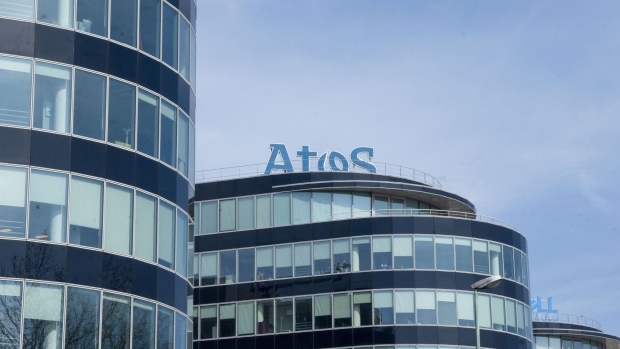Apr 9, 2024
Why France’s Onetime $15 Billion Tech Champion Needs State Aid
, Bloomberg News

(Bloomberg) -- Flush with cash and riding a $15 billion market value in 2017, Atos SE seemed to be bidding for anything and everything it could.
The IT company, through a series of high-profile acquisitions, looked poised to become a rare European tech champion. Current European Commissioner Thierry Breton, who led Atos at the time, boasted about a strong balance sheet and celebrated how he’d navigated all those mergers and acquisitions with no debt.
Then everything that could go wrong, did. Breton jumped ship for EU politics, investors started questioning Atos’s bottomless M&A appetite and auditors uncovered errors on the books of the US companies it had snapped up. An embarrassing revolving door of chief executive officers — averaging one every six months since 2021 — highlighted the group’s growing dysfunction.
Now, Atos has nearly €5 billion ($5.4 billion) in borrowings it can’t pay back. Its debt crisis has forced it to give the French government a golden share to its most strategic assets in return for interim financing, providing the state right of first refusal on any deal to sell them.
The accord is a black eye for French President Emmanuel Macron, who would like the world to see Paris as the Silicon Valley of Europe. The government was compelled to intervene for national security reasons, given Atos’s key role as a supplier of IT services to the country’s nuclear and defense sectors as well as for cybersecurity at this summer’s Paris Olympics.
Read More: Atos Seeks €1.2 Billion in Equity and Debt for Rescue Plan
Atos is now worth €226 million, down some 98% from its 2017 peak. Shares fell 14% on Tuesday after it warned it needs to halve its debt and said a deal to stave off bankruptcy will trigger a “significant dilution” in shareholders’ stakes.
The French government’s golden share came at a price of just €50 million, while Atos scraped together another €400 million in interim financing from a group of banks and bondholders.
Atos itself came into being from a mega-merger overseen by Breton — when in 2010 Atos Origin announced a deal to buy Siemens AG’s IT unit in a deal that the German company’s CEO said would create “a European champion.” Breton at the time said the alliance would open “a wide field of new business.”
More deals followed, including for French supercomputing firm Bull and Xerox ITO in 2014. These acquisitions propelled Atos into France’s blue-chip CAC 40 index in 2017, when its market capitalization peaked. The following year, it closed its biggest one yet, plunking down $3.4 billion for Syntel Inc. for more access to US financial customers.
Read More: How French IT Supplier to Nuclear Industry and Olympics Stumbled
But soon after, things began to unravel. Atos has been hit by a series of spectacular and often bizarre setbacks, leading some insiders and observers to point to a destabilization campaign, and making the company a prime target for short-sellers.
The company’s woes started in January 2021, when news of a proposal to acquire US rival DXC Technology Co. for as much $10 billion caused shares to tank as investors questioned the point of the deal.
The troubles were compounded by auditors finding accounting errors at two of its US entities that year, leading to a one-day loss of more than €1 billion in market value. In one odd incident, a man falsely claimed that he owned a 5% stake when in fact he didn’t own a single share, adding to the impression that no one knew what was happening.
‘No Choice’
As the shares continued to shed value, Atos announced a split plan designed by McKinsey & Co. consultants and backed by its then chairman Bertrand Meunier. The goal was to separate its ailing legacy IT outsourcing business and its more promising cloud, big data and cybersecurity activities.
But even that plan was star-crossed. CEO Rodolphe Belmer, who opposed the split, said it left him with “no choice but to resign” just five months into his tenure. Even so, he presented the concept to a perplexed crowd of analysts and journalists gathered in a Paris auditorium. Shares crashed 23%.
Meanwhile, talks to sell the two units have foundered. Czech billionaire Daniel Kretinsky’s EPEI ended talks to buy the legacy business in February, while Airbus SE last month walked away from negotiations over Atos’s big data and cybersecurity business.
Disagreements over strategy and a series of profit warnings kept the management carousel spinning, with current CEO Paul Saleh’s predecessor lasting just three months.
Revenue Decline
Customers were also alienated by the problems. Revenue is projected at €9.9 billion this year from €11.3 billion in 2022.
Analysts point to how Atos, despite of all of Breton’s M&A, wasn’t prepared for the big move in the IT- maintenance industry to the public cloud that has fueled growth at German competitor SAP SE.
Critics say the company’s rapid growth through acquisitions left it with a patchwork of disparate businesses that struggled to adapt to changes in the IT industry.
Breton, however, remains unapologetic.
“I have no responsibility, zero,” he said in March, saying he left the company debt free and well positioned to benefit from the rise of the cloud industry.
©2024 Bloomberg L.P.





